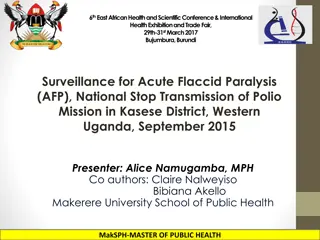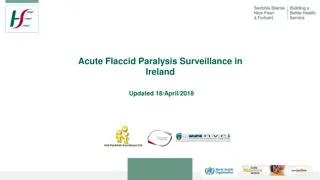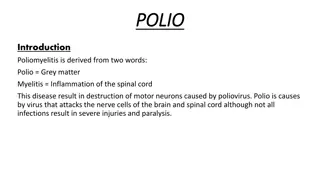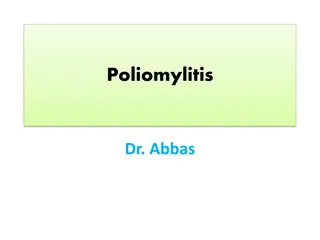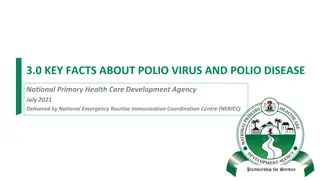Enhancing AFP Surveillance for Polio Eradication in East Africa
This presentation discusses the importance of Acute Flaccid Paralysis (AFP) surveillance in detecting poliomyelitis cases, with a focus on the National Stop Transmission of Polio Mission in Kasese District, Uganda. The goal is to eradicate poliovirus through strategies such as immunization campaigns
0 views • 12 slides
Acute Flaccid Paralysis Surveillance in Ireland - Update & Global Polio Eradication Efforts
The Acute Flaccid Paralysis (AFP) Surveillance in Ireland is crucial for monitoring poliomyelitis in the context of global polio elimination initiatives. With no cure for polio, prevention through vaccination is key. The global effort to eradicate polio has seen significant success, with a sharp dec
0 views • 21 slides
Understanding Poliomyelitis: Causes, Symptoms, and Prevention
Poliomyelitis, commonly known as polio, is an infectious viral disease caused by the poliovirus. It primarily affects young children, leading to the destruction of motor neurons. The disease can manifest with varying symptoms, ranging from mild flu-like symptoms to severe paralysis. Poliovirus is tr
0 views • 12 slides
Poliomyelitis: A Comprehensive Overview of the Disease
Poliomyelitis, commonly known as polio, is caused by a non-enveloped, positive, single-stranded RNA virus belonging to the Picornaviridae family. Paralysis is the most severe consequence of polio infection, with transmission occurring through the fecal-oral route. The virus primarily infects the GI
0 views • 23 slides
Understanding Poliovirus and Polio Disease: Key Facts and Insights
Poliovirus, a human RNA intestinal virus, causes polio disease with 3 serotypes. It spreads through poor sanitation, affecting the CNS in 3% of cases. Poliomyelitis, or polio, can lead to paralytic complications with significant morbidity and mortality rates.
0 views • 16 slides
